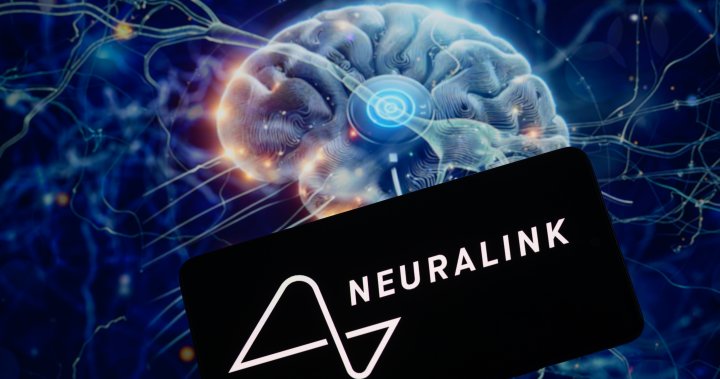Elon Musk‘s brain computer interface (BCI) company Neuralink is now accepting patient applications from Canadians interested in receiving the experimental assistive technology.
The inclusion of Canadians comes as the startup is facing criticism from a U.S. lawmaker who has accused the Food and Drug Administration (FDA) of failing to properly inspect Neuralink prior to human trials.
Already, one American man has had the “cosmetically invisible” computer chip inserted into his brain. Last week, Neuralink livestreamed the patient, 29-year-old Noland Arbaugh, as he used the brain chip to play online chess with only his mind.
Arbaugh was paralyzed below his shoulders after a diving accident eight years ago. He received the Neuralink implant in January.
On Saturday, Neuralink said its patient registry was now open to Canadian applicants.
To be considered, a Canadian must be over the age of 18 and have “quadriplegia, paraplegia, vision loss, hearing loss, the inability to speak, and/or major limb amputation (affecting above or below the elbow and/or above or below the knee.”
By applying, potential patients are vying for a spot in Neuralink’s Precise Robotically Implanted Brain-Computer Interface (PRIME) study.
According to the company, the PRIME study “could help transform the lives of people with paralysis,” like Arbaugh.
Neuralink has advertised that patients with their brain-chip can operate a computer or smartphone (including the ability to take phone calls, surf the web and play online games) with only thought control.
To function, the Neuralink implant uses a transmitter attached to ultra-fine “threads” that record neural activity. The implant is surgically inserted into a patient’s brain by a robot, according to the start-up’s website.
The FDA gave Neuralink the green light to conduct its first human trial in September 2023.
The email you need for the day’s
top news stories from Canada and around the world.
However, in a letter to the FDA on Monday, Democratic U.S. Representative Earl Blumenauer said “troubling evidence” of animal testing violations at Neuralink is reason for concern. According to Reuters, the violations date back to at least 2019.
Blumenauer cited a Reuters report that described employees’ complaints of “hack jobs” to do with animal experiments. The alleged testing violations were caused by a rushed schedule and led to needless suffering and deaths of animal test subjects.
According to Reuters, Neuralink has killed about 1,500 animals, including more than 280 sheep, pigs and monkeys, in experiments since 2018.
For their part, Neuralink has said they are committed to animal welfare.
Blumenauer asked the FDA to explain how it reconciled reports of such lapses with its decision to authorize Neuralink’s human trial.
“These alleged failures to follow standard operating procedures potentially endangered animal welfare and compromised data collection for human trials,” wrote Blumenauer.
In response to queries from Reuters about Blumenauer’s letter, the FDA said it would respond to the lawmaker directly. The agency also said it routinely carries out inspections after a human trial is approved. When it inspected Neuralink, the FDA said it did not find violations that would undermine the safety of the trial.
Neuralink and Telepathy
Neuralink’s brain chip is called Telepathy. In January, Musk likened the product to “if Stephen Hawking could communicate faster than a speed typist or auctioneer.” (Hawking, a theoretical physicist, was diagnosed with amyotrophic lateral sclerosis, or ALS.)
As well as the chip’s current ability to control a computer or smart phone, Musk has said he hopes the chip will one day assist patients in regaining movement of their limbs.
For Arbaugh, Telepathy helped him pull an all-nighter playing the video game Civilization 6, again using only his mind as the controller. Arbaugh said he would not have been able to do this prior to Neuralink.
“It wasn’t feasible for me to play a full game or anything,” he said. “Now I can literally just lie in bed and play to my heart’s content. Honestly the biggest restriction at this point was having to wait for the implant to charge once I had used all of it.”
Arbaugh said using Neuralink’s Telepathy felt like “using the force” from the Star Wars franchise on the cursor.
“I could get it to move wherever I wanted, just stare somewhere at the screen, and it would move where I wanted it to, which was such a wild experience,” Arbaugh said in a livestream to X.
Arbaugh said he is also learning French and Japanese and can read more easily since his Neuralink surgery.
He said he has suffered no “cognitive impairments” as a result of the two-hour surgical procedure.
“It’s not perfect; I would say that we have run into some issues,” Arbaugh revealed. “I don’t want people to think this is the end of the journey, there is still a lot of work to be done, but it has already changed my life.”
Neuralink has said participants in their PRIME Study can withdraw their consent at any time.
— With files from Reuters
© 2024 Global News, a division of Corus Entertainment Inc.

 Our Patient Registry is now open to Canadian residents! Join us in shaping the future of brain-computer interfaces by learning more and applying today
Our Patient Registry is now open to Canadian residents! Join us in shaping the future of brain-computer interfaces by learning more and applying today 

